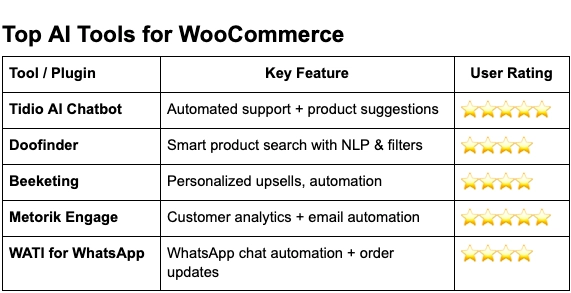“Personalization — it is not a trend; it is a marketing tsunami.”
— Avi Dan, Forbes Contributor
Table of Contents
- Introduction
- Why Personalization Matters in E-commerce
- How AI is Transforming WooCommerce
- Product Recommendations
- Smart Search
- Dynamic Pricing
- Customer Segmentation
- Chatbots & Virtual Assistants
- Top AI Tools for WooCommerce
- Real-World Success: AI Personalization in Action
- Challenges to Keep in Mind
- The Road Ahead: Future Trends in AI + WooCommerce
- Key Takeaways
- Conclusion
- References
Introduction
The e-commerce industry is rapidly evolving, and Artificial Intelligence (AI) is at the forefront of this transformation. In particular, WooCommerce, the world’s most popular WordPress-based eCommerce platform, is being supercharged with AI capabilities to deliver smarter, faster, and more personalized customer journeys.
Why Personalization Matters in E-commerce
Today’s customers expect brands to know them. Personalization has become a key differentiator in customer experience. Research by Epsilon shows that 80% of consumers are more likely to purchase from a brand that offers personalized experiences.
Benefits of AI-powered personalization:
- Higher engagement and click-through rates
- Reduced cart abandonment
- Increased conversions and AOV (Average Order Value)
- Enhanced brand loyalty and satisfaction
How AI is Transforming WooCommerce
1. Intelligent Product Recommendations
AI systems analyze user behavior, purchase history, and real-time interactions to suggest highly relevant products.
Use Case: Show “You May Also Like” sections personalized to each shopper.
2. Smarter Site Search
AI enhances search capabilities by including features like natural language processing, typo correction, and auto-suggestions.
Tool: Doofinder, which integrates seamlessly with WooCommerce.
3. Dynamic Pricing Engines
AI allows you to automatically adjust product prices based on supply, demand, user intent, or even competitor prices.
Example: Use a custom ML model or connect with pricing tools like Omnia or Prisync.
4. Customer Segmentation & Predictive Analysis
AI segments your customers based on behavior and predicts what they’re likely to do next — like abandoning their cart or purchasing soon.
Tool: Metorik Engage provides real-time segmentation and automation for WooCommerce.
5. AI Chatbots & Virtual Shopping Assistants
AI-driven chatbots offer 24/7 support, guide customers in real-time, and suggest products on the fly.
Popular Plugins: Tidio, WATI (for WhatsApp), and ChatBot.com
Top AI Tools for WooCommerce
“I believe artificial intelligence will fundamentally reshape e-commerce by enabling deeper personalization, predictive analytics, and highly efficient operations.” – Windy Pierree (eCommerce Manager)
Real-World Success: AI Personalization in Action
1. ASOS – AI-Driven Fashion Recommendations
ASOS uses machine learning to analyze browsing behavior and suggest styles tailored to the customer’s tastes. Their “Style Match” feature uses visual AI search to help shoppers find products similar to an uploaded image.
URL: https://www.asos.com
2. Sephora – Virtual Assistant for Makeup Recommendations
Sephora’s AI chatbot on Messenger and mobile app provides personalized skincare and makeup advice. It also uses AI-powered quizzes to suggest products.
3. North Face – Personalized Outerwear Suggestions
North Face uses IBM’s Watson (AI) to ask questions like where and when you’ll wear a jacket, then recommends the best fit based on weather and user preference.
URL: https://www.thenorthface.com
4. Netflix (Non-Ecommerce but Highly Relevant)
Netflix uses AI to personalize what users see on their home screen, recommend shows, and even dynamically choose thumbnail images based on viewer preferences.
Takeaway: WooCommerce sites can use similar personalization logic for banners, home page layouts, and featured products.
5. Amazon – The Global Benchmark in AI Personalization
Amazon’s entire e-commerce flow is driven by AI:
- Personalized homepage
- Smart recommendations
- Predictive product suggestions
- Dynamic pricing based on user behavior
6. H&M – Smart Recommendations with Visual AI
H&M leverages AI to analyze customer data and forecast trends. It also enables visual search so users can upload photos and find similar clothing items.
URL: https://www2.hm.com
7. eBay – Personalized Search Results and Pricing
eBay uses machine learning to personalize search rankings and product recommendations based on user preferences and past purchases.
URL: https://www.ebay.com
8. Boohoo – Style Suggestions and Dynamic Filters
Boohoo provides AI-generated “Complete the Look” suggestions and dynamic product filtering that adapts based on browsing habits.
9. Zalando – AI Styling Advice and Outfit Generator
Zalando uses an AI stylist tool that suggests entire outfits based on the user’s preferences, body type, and past interactions.
10. Etsy – Personalized Homepages and Recommendations
Etsy’s homepage, search results, and marketing emails are dynamically generated based on AI insights from each shopper’s preferences and behavior.
URL: https://www.etsy.com
“Personalization — it is not a trend; it is a marketing tsunami.”
— Avi Dan, Forbes Contributor
Challenges to Keep in Mind
While AI unlocks powerful opportunities, WooCommerce store owners should be mindful of:
- Privacy Laws (GDPR, CCPA): Ensure you get consent for data collection and AI profiling.
- Implementation Complexity: AI plugins and tools must be tested for compatibility and site performance.
- Cost of AI Tools: Advanced personalization often requires premium plugins or custom development.
- Avoiding “Creepy” Personalization: Over-targeting users can harm trust. Keep experiences helpful, not intrusive.
The Road Ahead: Future Trends in AI + WooCommerce
- Voice Commerce: Voice-activated shopping via Siri, Alexa, etc.
- Visual Search: Shoppers find products using photos instead of keywords.
- AI-Generated Content: From product descriptions to blogs using tools like ChatGPT.
- Inventory Forecasting: Predict stock demand using machine learning.
- Hyper-Personalized Campaigns: AI-built campaigns that change in real time per user behavior.
Key Takeaways
- AI is becoming essential for WooCommerce stores to compete in a crowded market.
- Personalization drives results, from more conversions to happier, loyal customers.
- Multiple AI tools already exist — from smart search and chatbots to recommendation engines.
- Getting started is easier than ever, with powerful plugins that integrate directly into WooCommerce.
- The future is proactive, not reactive — successful stores will predict customer needs and serve them in real time.
Conclusion
Artificial Intelligence is not just a tech trend — it’s reshaping how online shopping works. By leveraging AI, WooCommerce store owners can create deeply personalized, highly optimized customer journeys that stand out in a competitive e-commerce landscape.
Those who adopt early and invest in the right tools will not only enhance user satisfaction but also significantly boost their sales performance and long-term growth.
References
- WooCommerce Official Site – https://woocommerce.com/
- Tidio AI Chat – https://www.tidio.com/
- Metorik – https://metorik.com/
- Doofinder – https://www.doofinder.com/
- WATI – https://www.wati.io/
About the Author: Pratik Bhatt is a Head of WordPress at AddWebSolution, brings 12+ years of expertise in development, WooCommerce, and performance. I’m currently exploring how AI can enhance WordPress.





Hi there.
psitbd.com, Your consistency and kindness in this space don’t go unnoticed.
I recently published my ebooks and training videos on
https://www.hotelreceptionisttraining.com/
They feel like a hidden gem for anyone interested in hospitality management and tourism. These ebooks and videos have already been welcomed and found very useful by students in Russia, the USA, France, the UK, Australia, Spain, and Vietnam—helping learners and professionals strengthen their real hotel reception skills. I believe visitors and readers here might also find them practical and inspiring.
Unlike many resources that stay only on theory, this ebook and training video set is closely connected to today’s hotel business. It comes with full step-by-step training videos that guide learners through real front desk guest service situations—showing exactly how to welcome, assist, and serve hotel guests in a professional way. That’s what makes these materials special: they combine academic knowledge with real practice.
With respect to the owners of psitbd.com who keep this platform alive, I kindly ask to share this small contribution. For readers and visitors, these skills and interview tips can truly help anyone interested in becoming a hotel receptionist prepare with confidence and secure a good job at hotels and resorts worldwide. If found suitable, I’d be grateful for it to remain here so it can reach those who need it.
Why These Ebooks and Training Videos Are Special
They uniquely combine academic pathways such as a bachelor of hospitality management or a master’s degree in hospitality management with very practical guidance on the duties of a front desk agent. They also cover the hotel front desk job description, and detailed hotel front desk duties and responsibilities.
The materials go further by explaining the reservation systems in hotels, check-in and check-out procedures, guest relations, and practical guest service recovery—covering nearly every situation that arises in the daily business of a front office operation.
Beyond theory, my ebooks and training videos connect the academic side of hospitality management studies with the real-life practice of hotel front desk duties and responsibilities.
– For students and readers: they bridge classroom study with career preparation, showing how hotel management certificate programs link directly to front desk skills.
– For professionals and community visitors: they support career growth through interview tips for receptionist, with step-by-step questions to ask a receptionist in an interview. There’s also guidance on writing a strong receptionist description for resume.
As someone who has taught hotel and management courses for nearly 30 years, I rarely see materials that balance the academic foundation with the day-to-day hotel front desk job responsibilities so effectively. This training not only teaches but also simulates real hotel reception challenges—making it as close to on-the-job learning as possible, while still providing structured guidance.
I hope the owners of psitbd.com, and the readers/visitors of psitbd.com, will support my ebooks and training videos so more people can access the information and gain the essential skills needed to become a professional hotel receptionist in any hotel or resort worldwide.
Appreciate you and your community.
Hey there.
psitbd.com, It’s clear you put real effort into your site—thank you.
I recently published my ebooks and training videos on
https://www.hotelreceptionisttraining.com/
They feel like a rare find for anyone interested in hospitality management studies. These ebooks and videos have already been welcomed and found very useful by students in Russia, the USA, France, the UK, Australia, Spain, and Vietnam—helping learners and professionals strengthen their real hotel reception skills. I believe visitors and readers here might also find them practical and inspiring.
Unlike many resources that stay only on theory, this ebook and training video set is closely connected to today’s hotel business. It comes with full step-by-step training videos that guide learners through real front desk guest service situations—showing exactly how to welcome, assist, and serve hotel guests in a professional way. That’s what makes these materials special: they combine academic knowledge with real practice.
With respect to the owners of psitbd.com who keep this platform alive, I kindly ask to share this small contribution. For readers and visitors, these skills and interview tips can truly help anyone interested in becoming a hotel receptionist prepare with confidence and secure a good job at hotels and resorts worldwide. If found suitable, I’d be grateful for it to remain here so it can reach those who need it.
Why These Ebooks and Training Videos Are Special
They uniquely combine academic pathways such as a bachelor of hospitality management or a advanced hotel management course with very practical guidance on the duties of a front desk agent. They also cover the hotel front desk receptionist job description, and detailed hotel front desk tasks.
The materials go further by explaining the hotel reservation process, check-in and check-out procedures, guest relations, and practical guest service recovery—covering nearly every situation that arises in the daily business of hotel reception.
Beyond theory, my ebooks and training videos connect the academic side of resort management with the real-life practice of hotel front desk duties and responsibilities.
– For students and readers: they bridge classroom study with career preparation, showing how hotel and management course theory link directly to front desk skills.
– For professionals and community visitors: they support career growth through questions for reception interview, with step-by-step interview questions for receptionist with answers. There’s also guidance on writing a strong receptionist job description for resume.
As someone who has taught hospitality management programs for nearly 30 years, I rarely see materials that balance the academic foundation with the day-to-day hotel front desk job requirements so effectively. This training not only teaches but also simulates real hotel reception challenges—making it as close to on-the-job learning as possible, while still providing structured guidance.
I hope the owners of psitbd.com, and the readers/visitors of psitbd.com, will support my ebooks and training videos so more people can access the information and gain the essential skills needed to become a professional hotel receptionist in any hotel or resort worldwide.
Either way, thank you, psitbd.com, for maintaining such a respectful space online.
This was a great read—thanks for sharing!
Just thought I’d add a quick note that could help tourism businesses and resorts. We recently launched a super easy-to-use smart tourism chatbot designed especially for hospitality businesses looking to boost bookings, guest satisfaction, and 24/7 support—on autopilot.
It’s a lightweight chatbot widget that installs in minutes—no tech skills needed. This AI assistant for hotels runs all day and night to answer FAQs, even connecting with CRM tools.
See full details and live demo here:
https://chatbotforleads.blogspot.com/2025/04/boost-bookings-and-guest-satisfaction.html
But here’s the best part: besides hotel and tourism, we also offer a full range of chatbot solutions that work beautifully on any website, in any industry, to support customer service in a simple, smart, and wonderful way—only $69 lifetime. No subscriptions. No tech headaches.
Use it as a popup chatbot—and test it out instantly on our blog.
With nearly 30 years of experience in business development, we built this tool to be one of the most conversion-friendly options available for small businesses.
So if you’re ready to engage more guests, or just want a chatbot that works—we’d love for you to check it out.
Let us know how it works for your business!
Greetings psitbd.com,
You’re providing very useful content for your readers.
We assist website owners and bloggers to get qualified traffic and convert visitors into potential clients. Using the same method that reached you — posting targeted blog comments and contact form messages in your niche and location — our chatbot engages these visitors automatically to capture leads efficiently.
As a special offer, if you purchase our chatbot service (normally $69, now $49), simply tell us your website, and we will manage the comment and contact form service for you. We’ll create 1,000 niche-specific entries to bring visitors interested in your niche and location — by country or even by city.
We provide chatbots for many niches: general chatbots, real estate, dental, education, hotels & tourism, bars, cafés, automotive, and more.
See the full system here: https://chatbotforleads.blogspot.com/ — it shows precisely how the traffic and lead generation works in action.
Thank you for your time, and I hope this information is useful for you and your website visitors.